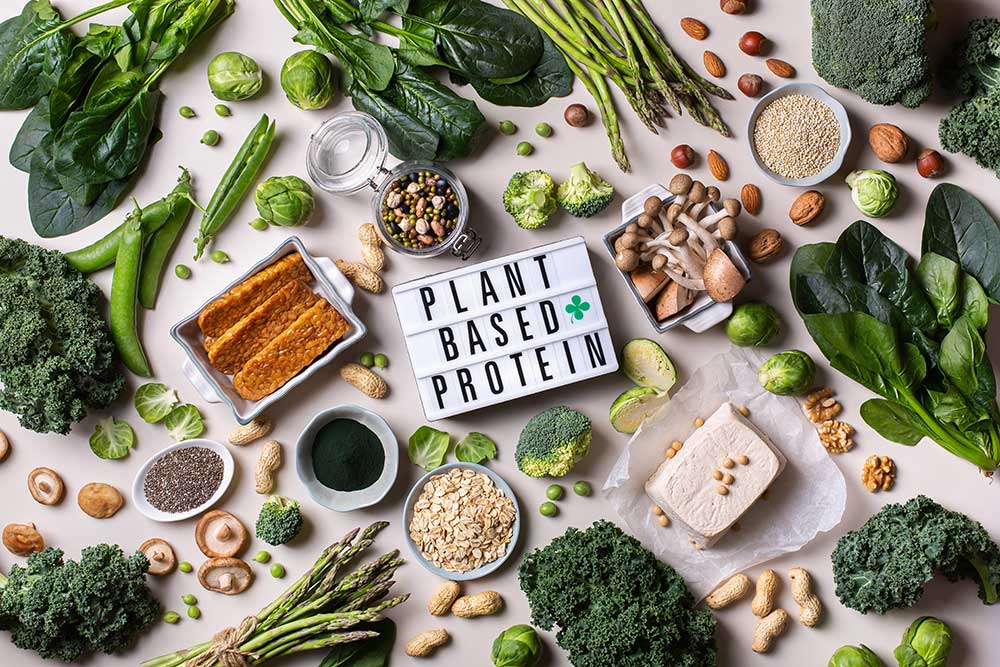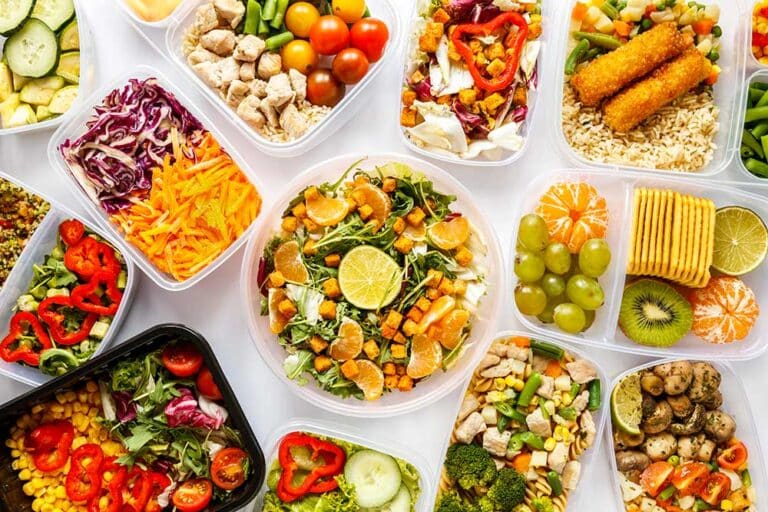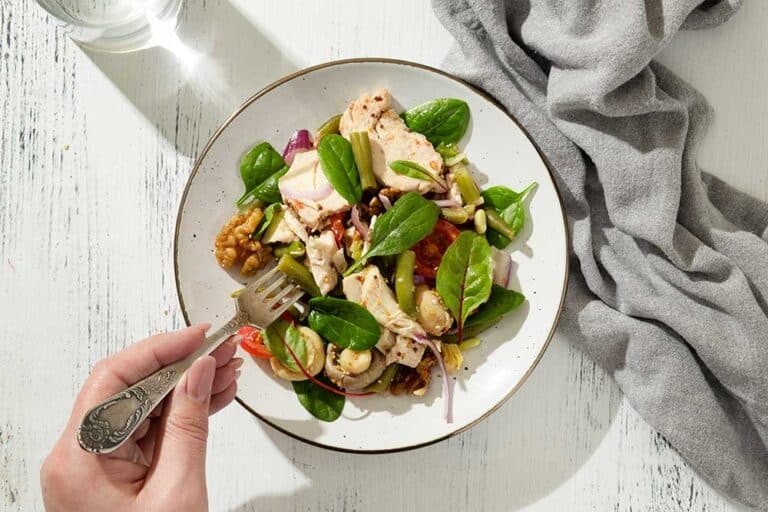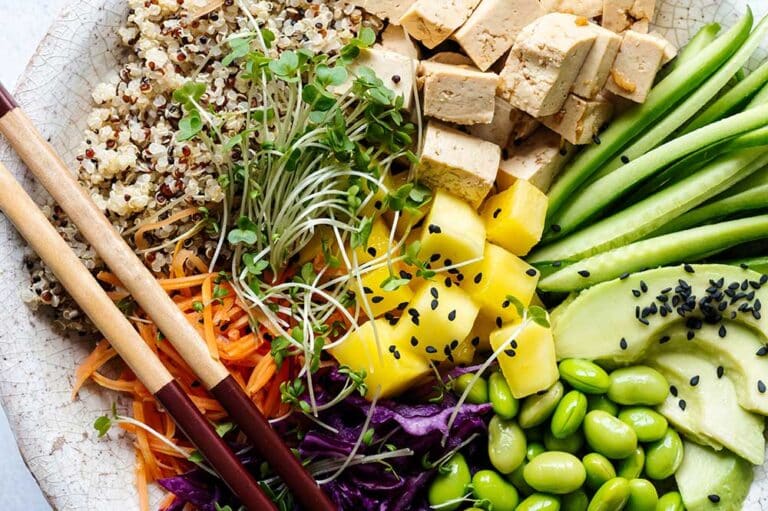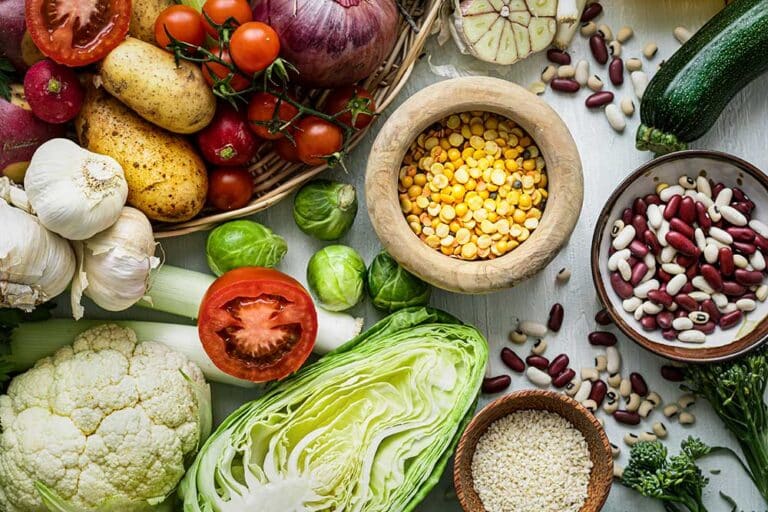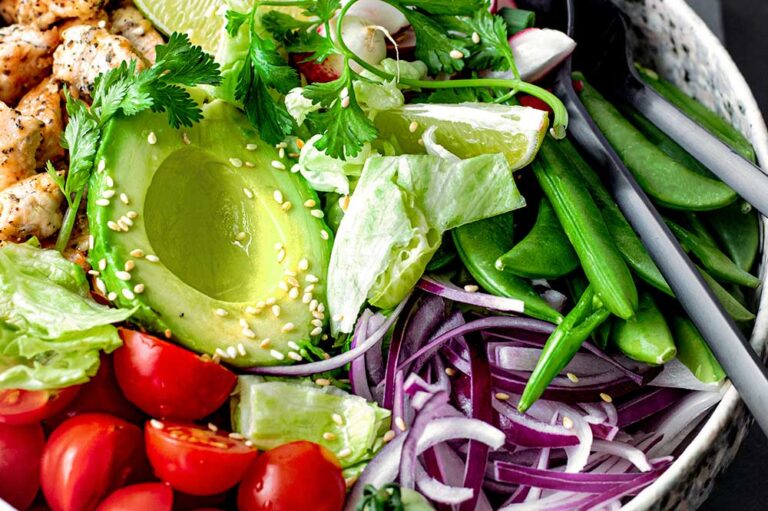Benefits of a Plant-Based Diet
Health Benefits of Plant-Based Eating
A plant-based diet offers numerous health benefits that can be particularly advantageous for athletes. Adopting a diet rich in fruits, vegetables, whole grains, nuts, and seeds helps in the prevention and management of chronic diseases (PubMed). These include heart disease, diabetes, and certain cancers. High concentrations of antioxidants and phytochemicals present in plant-based foods combat inflammation, improve immune function, and promote overall health.
| Health Aspect | Benefit |
|---|---|
| Heart Health | Reduced risk of cardiovascular diseases |
| Weight Management | Aids in weight loss and maintenance |
| Blood Pressure | Lowers hypertension |
| Blood Sugar | Helps manage diabetes |
A plant-based diet is also linked to improved digestion due to its high fiber content, which is beneficial in maintaining a healthy gut microbiome. This aspect of diet can significantly lower levels of LDL cholesterol (bad cholesterol) and contribute to better circulatory health. For those interested in starting this journey, check out our guide on how to start a plant-based diet.
Performance Enhancement in Athletes
Athletes following a plant-based diet often see notable performance enhancements. The high levels of complex carbohydrates found in plant-based foods ensure a more stable energy supply, particularly important for endurance training lasting over 90 minutes (PHA Berkeley). Unlike high-fat diets, which have not shown to improve exercise capacity, plant-based diets offer sustained energy and quicker recovery times due to their nutrient density.
Many world-class athletes have thrived on plant-based diets, attributing their success to dietary choices. Athletes like Scott Jurek, a renowned ultramarathon runner, and tennis stars Venus and Serena Williams have embraced plant-based eating and disclosed benefits such as increased energy and enhanced performance.
| Athlete | Achievement | Diet Details |
|---|---|---|
| Scott Jurek | Ultrarunner | Vegan |
| Venus Williams | Tennis Player | Vegan |
| Novak Djokovic | Tennis Player | Plant-Based |
| Lewis Hamilton | Formula 1 Driver | Vegan |
In addition to energy provisioning, plant-based diets contribute to muscle recovery. The antioxidants present in plant foods help reduce exercise-induced oxidative stress and inflammation, facilitating quicker recovery and reduced muscle soreness (PubMed).
For a deeper dive into the advantages, explore our detailed article on the benefits of plant-based eating. This will provide more insights into how adopting this diet can positively impact overall athletic performance and health.
Explore our plant-based diet recipes to get started on a diet that could elevate your athletic performance while maintaining optimal health.
Essential Nutrients for Plant-Based Athletes
Understanding the key nutrients required for athletes on a plant-based diet is fundamental for optimal performance and health.
Nutrient Considerations in Plant-Based Diets
To thrive on a plant-based diet, athletes must ensure they meet their nutritional needs, particularly considering the potential for anti-nutritional factors such as phytate and tannins, which can decrease the bioavailability of essential nutrients like iron, zinc, and protein.
Key Nutrients for Athletes
| Nutrient | Importance | Plant-Based Sources |
|---|---|---|
| Protein | Muscle repair and growth | Lentils, chickpeas, black beans, peas, soy products (LinkedIn) |
| Iron | Oxygen transport | Spinach, lentils, chickpeas, quinoa |
| Calcium | Bone health | Kale, broccoli, fortified plant milks |
| Vitamin B12 | Red blood cell production | Fortified cereals, nutritional yeast, supplements |
| Omega-3 fatty acids | Anti-inflammatory | Chia seeds, flaxseeds, walnuts |
| Zinc | Immune function | Pumpkin seeds, lentils, chickpeas |
| Vitamin D | Bone health | Fortified plant milks, sun exposure, supplements |
Protein is often a primary concern, but athletes can obtain sufficient levels by consuming a well-rounded diet with beans, nuts, and seeds. Plant-based protein powders are an option for those looking to increase intake.
Strategies for Nutrient Absorption
Ensuring proper nutrient absorption is crucial for athletes. Incorporating specific strategies can enhance the bioavailability of key nutrients.
Improving Iron and Zinc Absorption
Anti-nutritional factors can hinder the absorption of iron and zinc. Strategies include:
- Soaking and Sprouting: Soaking beans, grains, and seeds can reduce phytate content.
- Fermentation: Fermented foods like tempeh can increase mineral bioavailability.
- Vitamin C: Consuming vitamin C-rich foods (e.g., citrus fruits, bell peppers) with iron-rich meals enhances iron absorption.
Enhancing Protein Utilization
Combining different plant proteins throughout the day ensures all essential amino acids are obtained:
- Meals: A balanced mix of legumes, grains, nuts, and seeds.
- Snacks: Incorporating high-protein plant-based foods like edamame and hummus.
| Protein-Rich Foods | Protein Content (g per serving) |
|---|---|
| Cooked Lentils | ~18 per cup |
| Tofu | ~10 per half-cup |
| Tempeh | ~15 per half-cup |
| Edamame | ~17 per cup |
Figures based on LinkedIn
Athletes should also consider sport supplements to meet specific nutritional needs, which is discussed further in our section on utilizing sport supplements.
Essential Fatty Acids
Ensuring adequate intake of omega-3 fatty acids from sources like chia seeds and flaxseeds can support anti-inflammatory processes.
For more detailed meal planning and recipes, check out our plant-based diet meal plan and plant-based diet recipes.
By addressing these nutrient considerations and employing strategies for improved absorption, plant-based athletes can optimize their diet for enhanced performance and overall well-being.
Sources of Nutrients for Plant-Based Athletes
Plant-Based Protein Sources
Protein is a critical nutrient for athletes to maintain muscle mass, repair tissue, and support overall performance. Fortunately, there are numerous high protein plant-based foods that can provide the necessary protein for those following a plant-based diet.
Legumes
Legumes, including lentils, chickpeas, black beans, and peas, are excellent sources of protein for vegan athletes. A cup of cooked lentils, for example, provides about 18 grams of protein LinkedIn.
| Legume | Protein (grams per cup, cooked) |
|---|---|
| Lentils | 18 |
| Chickpeas | 15 |
| Black Beans | 15 |
| Peas | 9 |
Soy Products
Soy products such as tofu, tempeh, and edamame are among the most protein-rich plant foods. Tofu contains about 10 grams of protein per half-cup serving, tempeh offers approximately 15 grams of protein per half-cup, and edamame provides about 17 grams of protein per cup LinkedIn.
| Soy Product | Protein (grams per serving) |
|---|---|
| Tofu (½ cup) | 10 |
| Tempeh (½ cup) | 15 |
| Edamame (1 cup) | 17 |
Quinoa
Quinoa is a unique grain as it contains all nine essential amino acids, making it a complete protein. One cup of cooked quinoa provides around 8 grams of protein LinkedIn.
Seitan
Seitan, also known as wheat gluten, is a highly protein-dense food, containing about 25 grams of protein per 3.5 ounces (100 grams). Seitan is a versatile meat substitute for vegan diets LinkedIn.
Nuts and Seeds
Nuts and seeds such as almonds, chia seeds, flaxseeds, and hemp seeds are excellent sources of protein and healthy fats. A quarter cup of hemp seeds provides around 10 grams of protein. These also contribute omega-3 fatty acids beneficial for heart health LinkedIn.
| Nuts/Seeds | Protein (grams per serving) |
|---|---|
| Almonds (¼ cup) | 8 |
| Chia Seeds (2 tbsp) | 4 |
| Flaxseeds (2 tbsp) | 4 |
| Hemp Seeds (¼ cup) | 10 |
For more plant-based diet recipe ideas, visit our plant-based diet recipes page.
Hard-to-Get Nutrients for Athletes
Athletes following a plant-based diet need to be particularly mindful of certain nutrients that are harder to obtain from plant sources. These include vitamin B12, iron, calcium, omega-3 fatty acids, and vitamin D.
Vitamin B12
Vitamin B12 is primarily obtained from animal products and is essential for blood and nerve function. Plant-based athletes can use fortified foods or a vitamin B12 supplement to meet their needs.
Iron
Iron is crucial for oxygen transport and energy production. While plant-based iron (non-heme iron) is not as easily absorbed as animal-based iron (heme iron), consuming foods rich in vitamin C can enhance absorption. Legumes, spinach, and fortified cereals are good sources.
Calcium
Calcium is vital for bone health. Fortified plant milks, dark leafy greens, and almonds can contribute to daily calcium needs.
Omega-3 Fatty Acids
Omega-3s are important for heart and brain health. Flaxseeds, chia seeds, hemp seeds, and walnuts are excellent plant-based sources. Algal oil supplements can also provide DHA and EPA.
Vitamin D
Vitamin D is essential for bone health and immune function. Sun exposure, fortified foods, and supplements are common sources.
For more information on creating a balanced plant-based diet meal plan, visit our plant-based diet meal plan guide.
By incorporating a variety of these nutrient-rich foods, plant-based athletes can maintain optimal health and performance. For those starting out, our plant-based diet for beginners guide is a helpful resource.
Success Stories of Plant-Based Athletes
Athletes Thriving on Plant-Based Diets
World-class athletes are increasingly turning to plant-based diets and showcasing remarkable performance improvements. Notable examples include Scott Jurek, a renowned ultramarathoner, and Alex Morgan, a professional soccer player. These athletes credit their dietary choices for increased energy levels, faster recovery times, and overall improved health.
Table of Athletes and Their Achievements
| Athlete | Sport | Achievement |
|---|---|---|
| Scott Jurek | Ultramarathon | Multiple ultramarathon wins |
| Alex Morgan | Soccer | FIFA Women’s World Cup Champion |
| Cam Newton | Football | NFL MVP, led team to Super Bowl |
| Rich Roll | Triathlon | Ultra-endurance athlete, multiple Ironman wins |
High protein plant-based foods provide the fuel these athletes need. Athletes like Rich Roll and Patrik Baboumian show that muscle building and endurance are achievable on a plant-based diet (No Meat Athlete).
Elite Athletes’ Plant-Based Journey
Elite athletes have made headlines by successfully adopting plant-based diets. Venus Williams, a tennis legend, turned to plant-based eating to manage an autoimmune disease, resulting in improved performance and health. Novak Djokovic, another tennis star, attributes his diet for enhanced energy and recovery (ISPO).
Table of Elite Athletes and Their Dietary Benefits
| Athlete | Sport | Diet Benefit |
|---|---|---|
| Venus Williams | Tennis | Improved autoimmune disease management |
| Novak Djokovic | Tennis | Increased energy, quicker recovery |
| Lewis Hamilton | Formula 1 | Increased energy, better productivity, quicker recovery |
Athletes like Fiona Oakes and Andreas Kraniotakes demonstrate that a plant-based diet can sustain high-intensity sports. Robert Cheeke, a bodybuilder, and Patrik Baboumian, a strongman, both excel in their fields on a vegan diet.
For those considering this dietary shift, explore how to start a plant-based diet for beginners or refer to a plant-based diet meal plan tailored for athletes seeking optimal performance and recovery.
Optimization Strategies for Athletes
When following a plant-based diet for athletes, it’s essential to optimize nutrient absorption and consider appropriate supplementation to support peak performance. This section explores strategies for improving nutrient bioavailability and utilizing sport supplements for plant-based athletes.
Improving Nutrient Bioavailability
Plant-based diets can be rich in essential nutrients; however, certain anti-nutritional factors like phytate and tannins can impede the absorption of key nutrients such as iron, zinc, and protein. Here are some strategies to enhance nutrient bioavailability.
- Soaking and Sprouting: Soaking beans, nuts, and seeds before consumption can reduce the levels of phytate and tannins.
- Fermentation: Foods like tempeh and miso, which undergo fermentation, have improved nutrient absorption properties.
- Pairing with Vitamin C: Consuming iron-rich plant foods with vitamin C-rich fruits and vegetables can enhance iron absorption.
- Using Leavened Bread: Opt for leavened whole grain bread as it contains less phytate compared to unleavened bread.
| Key Nutrient | Enhancing Strategy |
|---|---|
| Iron | Pair with Vitamin C (e.g., spinach with bell peppers) |
| Protein | Consume a variety of proteins (e.g., beans, nuts, seeds) |
| Zinc | Include zinc-rich foods like pumpkin seeds, oats |
| Calcium | Use fortified plant milks, tofu |
For more practical tips on plant-based diet recipes that enhance nutrient bioavailability, visit our detailed guide.
Utilizing Sport Supplements
Despite a well-balanced diet, some athletes may require additional supplements to meet their nutritional needs. Here are key supplements for plant-based athletes.
- Protein Powders: While most athletes can obtain sufficient protein from a varied plant-based diet, protein powders like pea, hemp, and brown rice protein can help those needing extra protein (No Meat Athlete).
- B12: Vitamin B12, primarily found in animal products, is essential for nerve function and energy. Plant-based athletes should consider B12 supplements or fortified foods.
- Omega-3 Fatty Acids: Algal oil supplements are a plant-based source of DHA and EPA, important for reducing inflammation and supporting heart health.
- Vitamin D: Essential for bone health and immune function, vitamin D can be obtained through sunlight exposure or supplements, especially in regions with limited sunlight.
- Iron: If struggling to maintain adequate iron levels, iron supplements or iron-fortified cereals can be beneficial.
| Supplement | Purpose | Source |
|---|---|---|
| Protein Powder | Muscle repair and growth | Pea, Hemp, Brown Rice |
| Vitamin B12 | Energy, nerve function | Supplements, Fortified foods |
| Omega-3 | Inflammation, heart health | Algal oil |
| Vitamin D | Bone health, immune function | Sunlight, Supplements |
| Iron | Red blood cells, oxygen transport | Supplements, Fortified cereals |
Consider consulting with a nutritionist to tailor these supplements to personal health needs and training goals. For more information, check out our articles on high protein plant-based foods and plant-based diet benefits.
Research Insights on Plant-Based Diets
Impact of Plant-Based Diets on Athletic Performance
Research has increasingly focused on the effects of a plant-based diet on athletic performance. Studies suggest positive correlations between plant-based eating and various performance metrics, indicating that such diets might benefit athletes in multiple ways.
- Long-Term Performance: Long-term vegetarian and vegan diets do not negatively impact endurance or strength. In some cases, plant-based diets may even improve performance, particularly in aerobic exercises (PMC).
- Body Composition: Athletes following a plant-based diet often have leaner bodies and reduced body fat percentage. Research shows lower BMI, waist circumference, and fat mass index among those on plant-based diets (PHA Berkeley Student Organization).
- Energy Levels: High carbohydrate intake is crucial for athletes, particularly those engaging in prolonged physical activity. Plant-based diets provide complex carbohydrates that offer sustained energy during endurance training (PHA Berkeley Student Organization).
Below is a summary of key benefits:
| Impact Area | Effect of Plant-Based Diets |
|---|---|
| Endurance | No detrimental impact; potential for improvement |
| Body Composition | Leaner bodies, reduced body fat percentage |
| Energy Levels | Sustained energy due to complex carbohydrates |
For more on the benefits, read our section on plant-based diet benefits.
Studies and Trends in Plant-Based Nutrition
Evidence supports the growing trend of athletes adopting plant-based diets for optimal health and performance.
- Nutrient Bioavailability: Reviews summarize strategies to enhance nutrient bioavailability, crucial for athletes.
- High-Carb Diets: High-fat diets are not beneficial for athletic performance. High-fat, low-carb diets can impair energy production pathways. Plant-based diets ensure sufficient glucose and glycogen stores needed for high-intensity performance (PHA Berkeley Student Organization).
- Athletic Endorsements: Elite athletes and sports organizations increasingly endorse plant-based eating, reinforcing its benefits.
For those new to the lifestyle, check out our guide on how to start a plant-based diet.
| Study Focus | Findings |
|---|---|
| Endurance and Strength | No long-term negative effects; potential for aerobic performance improvement |
| Carbohydrate Importance | High-carb diets crucial for endurance; complex carbs from plants enhance performance |
| High-Fat Diets | High-fat, low-carb diets do not enhance performance; not recommended for athletes |
Explore our resources on plant-based diet meal plan and plant-based diet recipes for tailored advice and meal ideas to support your athletic goals.
- About the Author
- Latest Posts
Johnnie D. Jackow Sr., the founder and CEO of Total Body Fitness, Worldwide, has a long-standing career in the fitness industry. He began as a certified personal trainer in the mid-90s and soon after authored his first weight loss book in 1998. This led to the launch of Total Body Fitness, Nationwide in the USA at the same time. Johnnie gained recognition as the fitness guru of his time, running infomercials on local TV late at night in Houston, Texas. Over the years, he has helped more than 40,000 individuals from all over the world achieve their health and fitness goals. With over 60,000 hours of documented training in integrative functional medicine, he completed his PhD in human physiology in 2010. His primary objective is to assist people in reaching their health and fitness goals through alternative approaches rather than relying solely on conventional medicine and pharmaceutical drugs. Today, with almost three decades of experience under his belt, Johnnie continues to be a leader in health and fitness.

